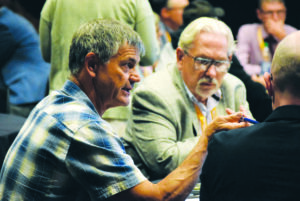Pressure mounts for utility breaks
By James Tubb on June 22, 2022.
 Redcliff Mayor Dwight Kilpatrick discusses infrastruture funding formulas in a tble talk at Tuesday's meeting of Alberta municipal leaders in Medicine Hat on Tuesday at the Esplanade. Also pictured is Bow Island Maor Gord Reynolds. -- News Photo Collin Gallant, June 21, 2022
Redcliff Mayor Dwight Kilpatrick discusses infrastruture funding formulas in a tble talk at Tuesday's meeting of Alberta municipal leaders in Medicine Hat on Tuesday at the Esplanade. Also pictured is Bow Island Maor Gord Reynolds. -- News Photo Collin Gallant, June 21, 2022Twitter: CollinGallant A growing number of Alberta’s towns and cities are asking the province for utility rate relief, including the Town of Redcliff, which has the City of Medicine Hat as the power and gas provider. Others are considering combining utility purchasing power to get better prices, or even getting into the game themselves as solar energy providers. Redcliff Mayor Dwight Kilpatrick told the News on Tuesday that his council’s support for a letter-writing campaign last month — asking the province to examine capping rates — is not a swipe at the city. But, he said, high prices are hurting local governments and their residents. “Communities are doing it because rates are spiking, and in the past here were caps, and the current company eliminated all that,” said Kilpatrick during a break at Tuesday’s meeting of Alberta Municipalities, formerly the AUMA lobbying group ,in Medicine Hat. “In unison with some other communities, the goal was to see whether caps could be implemented.” He said the effort didn’t get far, and the answer seems to be the government is providing a total of $150 in rebates on consumer power bills this summer. A similar relief measure for rising natural gas bills will come into effect next fall. However, says Kilpatrick, Redcliff’s municipal power bill to run town facilities, an arena and street lighting was $14,000 per month last year, much of it fees, not power or gas. “There are many advantages,” of city power he said, including taxation and avoiding provincial transmission fees that can cost homeowners elsewhere more than $25 a month. But like many Medicine Hat ratepayers, Kilpatrick would like the city to offer the lowest cost rather than a floating rate at the provincial average. Medicine Hat Mayor Linnsie Clark said the city’s utility administrators are cognizant of widespread concern over high prices. “We are doing an internal rate review that is in the early stage,” she told the News on Tuesday, of the study announced this winter and due in early 2023. “People need power, and there are some levers the province could pull. Ultimately that has to be balanced against the (cost of the) fuel source for electric utility as well,” said Clark. As for extending breaks, the city often sets contract rates with large customers, and offers a fixed rate based more on cost-recovery plus a return. “If Medicine Hat’s utility rates aren’t competitive, then the City of Medicine Hat isn’t competitive,” she said. Cathy Heron is the mayor of St. Albert and president of the Alberta Municipalities lobbying group, which discussed a number of topics with about three dozen visiting elected officials on Tuesday. They included developing positions on establishing a provincial police force, ambulance response times, infrastructure funding models and more. Heron’s city is now embarking on a feasibility study to build a 15-megawatt solar farm in the community on the edge of Edmonton, which could supply the municipal corporation’s needs or export power to the grid, like the City of Medicine Hat. “We know they can make money … but I’m hoping that even if it breaks even, we’ll go forward with it,” she said. “As a municipality, we need to do our part to clean the grid, and it does attract international investment.” Alberta Municipalities has launched a program called “Power+” in which towns and cities could band together and leverage the cumulative size of their power buy into better pricing on power supply. Heron called the interest so far “substantial.” School boards across the province have done this for more than a decade, but local schools in Medicine Hat and Redcliff have been left out as they fall inside the city power company’s exclusive franchise area. Over the last year, gas prices rose at the same time as power prices. That led the city to re-adjust its fixed rate for power to 8-cents per kilowatt hour, up from 6.8-cents in 2021. To date, the Alberta Pool price has averaged 10.6 cents per kilowatt hour, and the average default price from major providers (on which the city bases its floating rate) has been as high as 13 cents. 27
-26
3 Comments
Oldest




